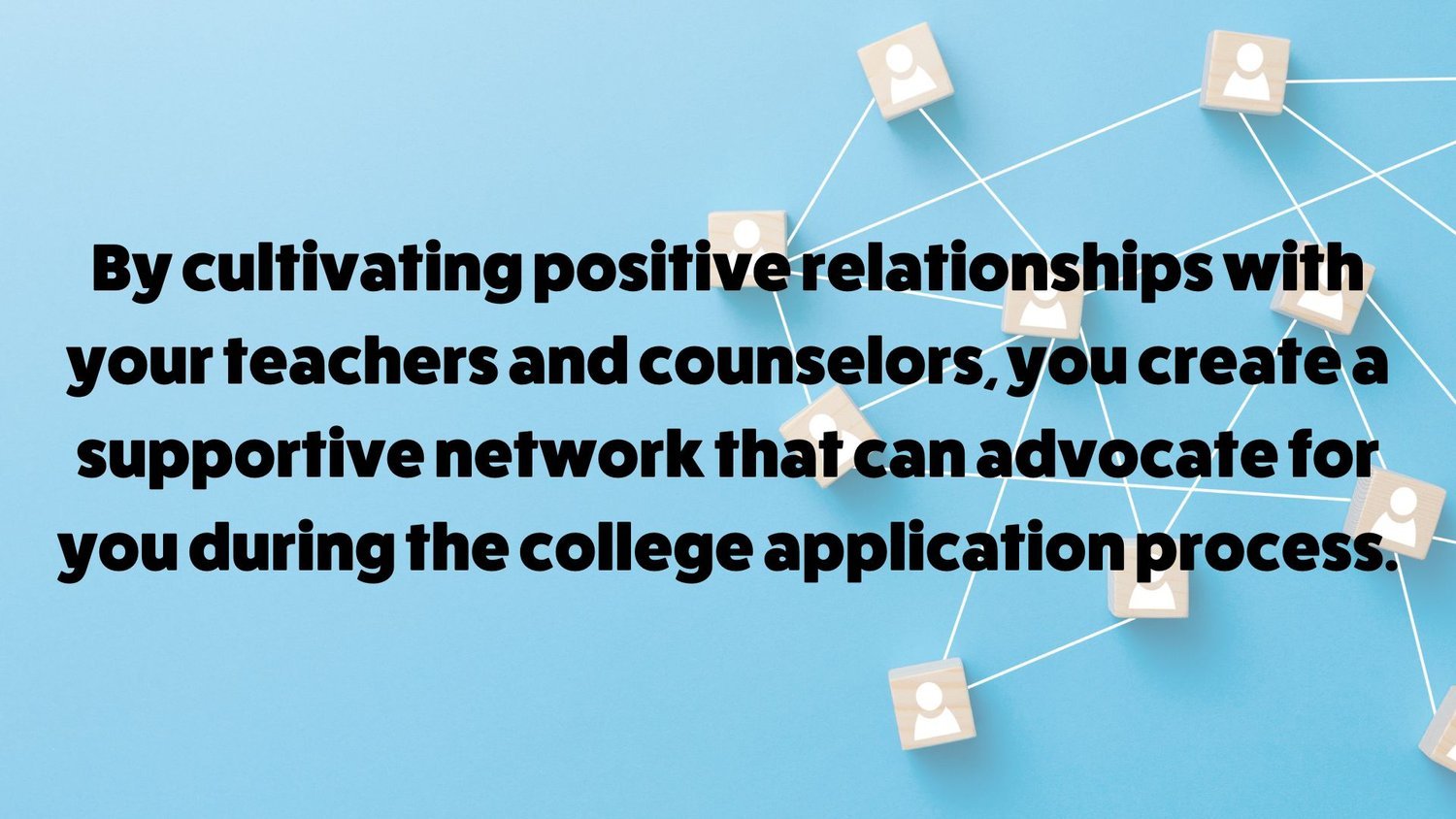How to Get into College: 10 Essential Steps to Get into College
Getting into college is an exciting and crucial milestone in one's academic journey. It's a time of self-discovery, growth, and the opportunity to pursue your passions. However, the college admission process can be daunting, with numerous factors to consider and steps to take. In this blog post, we will guide you through ten essential steps that will increase your chances of getting into college. Whether you're a high school student or a parent supporting your child's college aspirations, these steps will provide valuable insights and strategies for success.
As you embark on this transformative journey, it's important to approach the college admission process with confidence and preparation. By understanding the key steps involved and implementing effective strategies, you can navigate the complexities of college applications with ease. From self-reflection and goal setting to crafting a compelling personal statement, each step plays a crucial role in shaping your college admission prospects.
Interested in showcasing your intellectual vitality and initiative during high school? Find out how YOU can apply artificial intelligence to the subjects that interest you in InspiritAI’s AI Scholars Program. Students in the Inspirit AI Scholars program craft interdisciplinary AI projects engaging subjects of personal interest to them. Additionally, many students who have participated in the AI+X Individual Research Mentorship have gone on to win prestigious awards at various science fair competitions!
Let's delve into the ten essential steps that will help you secure your admission to the college of your dreams. With dedication, hard work, and the right guidance, you can turn your college aspirations into a reality.
1. SELF-REFLECTION AND GOAL SETTING
Before embarking on the college admission journey, it's important to engage in self-reflection and set clear goals. Taking the time to introspect and understand yourself will not only help you choose the right college but also shape your overall college experience.
Start by asking yourself important questions: What are your academic interests? What are your passions and strengths? What do you hope to achieve in college and beyond? Reflecting on these aspects will give you a clearer sense of direction and purpose.
Consider your long-term aspirations, such as potential career paths or fields of study you wish to pursue. Think about the kind of environment that will support your growth and challenge you intellectually. By understanding your goals, you can tailor your college search to find institutions that offer the programs, resources, and opportunities aligned with your ambitions.
Furthermore, self-reflection helps you identify your values, personal qualities, and unique experiences that shape your identity. These aspects can be highlighted in your college applications, showcasing your authentic self to admissions committees.
Setting clear goals is equally important. Establish both short-term and long-term objectives to keep yourself motivated throughout the application process. Break down your goals into actionable steps, such as improving your grades, engaging in relevant extracurricular activities, or seeking mentorship opportunities. By setting specific targets, you can track your progress and ensure you're moving closer to your desired outcomes.
Remember, self-reflection and goal setting are ongoing processes. As you gather more information and experiences, your aspirations may evolve. Stay open to self-discovery and be willing to adjust your goals accordingly. Embrace the journey of self-exploration as you prepare for the exciting path ahead toward college admission.
2. RESEARCHING COLLEGES
Once you have a sense of your aspirations, it's time to dive into researching potential colleges that align with your academic and personal interests. This step is crucial as it lays the foundation for finding the right fit for your college education.
Begin by gathering information about different colleges and universities. Explore their websites, admission brochures, and virtual tours to gain insights into their programs, majors, and campus culture. Look for colleges that offer the academic disciplines you're interested in, along with extracurricular activities and resources that align with your passions and personal growth.
Consider factors such as location, size, campus environment, and available facilities. Do you prefer an urban or rural setting? Are you looking for a small, close-knit community or a larger, more diverse campus? Assess your preferences and determine the type of environment that will enhance your college experience.
Attending college fairs and information sessions can be valuable opportunities to interact with college representatives and ask questions directly. Seek guidance from school counselors, teachers, or alumni who can provide insights into specific colleges or share their personal experiences.
Furthermore, reach out to current students or alumni of the colleges you're interested in. Their perspectives can offer valuable firsthand information about campus life, academics, and the overall student experience.
As you research colleges, compile a list of institutions that resonate with your goals, preferences, and values. This list will serve as the foundation for your college application process, helping you stay organized and focused on institutions that best align with your aspirations.
3. MAINTAINING A STRONG GPA
Maintaining a strong grade point average (GPA) is a critical aspect of the college admission process. Admissions committees often consider your academic performance as an indicator of your potential success in college. Here are some key strategies to help you excel academically and maintain a strong GPA.
First and foremost, prioritize your studies and develop effective study habits. Create a study schedule that allows for regular and consistent study sessions. Break down your coursework into manageable chunks, and allocate dedicated time for each subject. Consider using study techniques such as active reading, note-taking, and reviewing class materials regularly to reinforce your understanding.
Take advantage of additional academic resources available to you. Seek help from teachers, tutors, or study groups when you encounter challenging concepts or subjects. Don't hesitate to ask questions and clarify any uncertainties you may have. Remember, maintaining a strong GPA requires a proactive approach to your education.
Stay organized and keep track of assignment due dates, exams, and project deadlines. Utilize a planner or digital tools to manage your schedule effectively. By staying on top of your academic responsibilities, you can avoid last-minute stress and complete tasks with care and attention to detail.
Recognize the importance of consistent effort throughout the semester. Aim for excellence in your coursework, not just in individual assignments or exams. Engage actively in class discussions, participate in group projects, and seek opportunities to deepen your understanding beyond the requirements of the curriculum.
Lastly, take care of your overall well-being. Get sufficient rest, eat nutritious meals, and engage in physical activities. Maintaining a healthy lifestyle contributes to your overall academic performance by enhancing focus, concentration, and mental well-being.
By maintaining a strong GPA, you demonstrate your dedication to academic excellence and showcase your ability to handle the rigors of college-level coursework. Remember, while GPA is important, it is not the sole determining factor in college admission. However, a strong academic foundation will undoubtedly strengthen your college applications and increase your chances of gaining admission to your desired institutions.
4. TAKING CHALLENGING COURSES
To stand out among college applicants and demonstrate your academic potential, it's essential to challenge yourself by taking rigorous courses. Admissions committees value students who have pursued a challenging academic curriculum throughout high school. Here are some key considerations when selecting and excelling in challenging courses:
Firstly, assess your academic strengths and interests. Identify subjects that you find intriguing and align with your career aspirations. Seek out advanced courses or specialized tracks in those areas to further deepen your knowledge and skills. Examples include honors, Advanced Placement (AP), International Baccalaureate (IB), or dual enrollment courses.
Consult with your teachers, counselors, or mentors to gather insights on suitable challenging courses. They can provide guidance based on your academic abilities and interests. Consider their recommendations while keeping in mind your personal goals and aspirations.
Taking challenging courses requires discipline, time management, and a commitment to academic excellence. Be prepared to dedicate extra effort to grasp complex concepts, complete rigorous assignments, and perform well on challenging exams. Develop effective study strategies, such as creating a study schedule, utilizing resources like textbooks and supplementary materials, and seeking help when needed.
Engage actively in class discussions, participate in group projects, and leverage opportunities to delve deeper into the subject matter. Take advantage of office hours or additional resources offered by teachers to further enhance your understanding of the course material.
By taking challenging courses, you not only demonstrate your intellectual curiosity and passion for learning but also develop valuable skills such as critical thinking, problem-solving, and time management. These skills will not only benefit you in college but also prepare you for future academic and professional endeavors. Remember, the aim is not merely to take difficult courses, but to excel in them and showcase your dedication to academic excellence.
5. STANDARDIZED TESTS: SAT/ACT
Standardized tests like the SAT and ACT play a significant role in the college admission process. These tests provide colleges with a standardized measure of your academic abilities and serve as a benchmark for comparing applicants. Here are some key strategies to excel in standardized tests:
Start by familiarizing yourself with the format and content of the SAT or ACT. Understand the different sections, question types, and time constraints. Review sample questions and take practice tests to become comfortable with the test structure and pacing.
Create a study plan and set aside dedicated time for test preparation. Consider enrolling in test preparation courses or utilizing online resources to gain valuable insights and techniques. Practice regularly and focus on areas where you need improvement. Review concepts, practice time management, and develop effective test-taking strategies.
Consider seeking guidance from tutors or attending test preparation workshops. They can provide personalized instruction, address your specific areas of weakness, and offer valuable tips and strategies to maximize your scores. Additionally, they can help you identify patterns in the test questions and develop effective approaches for tackling them.
Take advantage of the free resources provided by test makers, such as official practice tests and study guides. These resources are designed to familiarize you with the test structure and provide an accurate representation of the actual exam.
While standardized test scores are essential, remember that they are just one component of your overall application. Focus on achieving a balanced application by emphasizing other aspects such as GPA, extracurricular activities, and personal statements.
Keep in mind that some colleges have become test-optional or test-flexible, meaning they do not require SAT or ACT scores for admission. Research the admission policies of your target colleges to determine if submitting scores is necessary or advantageous.
By approaching standardized tests with a strategic mindset, dedicated preparation, and effective study techniques, you can enhance your scores and strengthen your college application. Remember, standardized test scores are just one piece of the puzzle, and colleges also consider your overall academic achievements and personal qualities.
6. CRAFTING A COMPELLING PERSONAL STATEMENT
The personal statement, also known as the college essay, is your opportunity to showcase your unique voice, experiences, and perspectives to admissions committees. It plays a crucial role in distinguishing yourself from other applicants. Here are some key considerations when crafting a compelling personal statement:
Start by brainstorming ideas and reflecting on significant experiences, challenges, or personal growth moments that have shaped your identity or influenced your aspirations. Choose a topic that allows you to convey your authentic self and highlight your values, passions, and personal qualities.
Create a captivating introduction that grabs the reader's attention and establishes the tone for your essay. Craft a clear and concise thesis statement that sets the direction for your essay and conveys your central message.
Structure your essay with a logical flow, incorporating well-developed paragraphs that support your main ideas. Use descriptive language and vivid storytelling techniques to engage the reader and create a compelling narrative.
Demonstrate self-reflection and critical thinking by offering meaningful insights or lessons learned from your experiences. Avoid generic statements and clichés, instead focusing on showcasing your unique perspective and individuality.
Pay attention to your writing style and tone. Strive for clarity, coherence, and precision in your language. Edit and revise your essay multiple times to ensure it is free from grammatical errors and typos.
Seek feedback from trusted individuals, such as teachers, counselors, or mentors. Their perspectives can provide valuable insights and suggestions for improvement. However, ensure that your personal statement remains true to your voice and experiences.
Crafting a compelling personal statement requires time, effort, and self-reflection. It allows admissions committees to gain a deeper understanding of who you are beyond your grades and test scores. Use this opportunity to make a lasting impression and convey your unique story and aspirations.
7. BUILDING A STRONG EXTRACURRICULAR PROFILE
Colleges value students who demonstrate a commitment to extracurricular activities and have made significant contributions outside of the classroom. Building a strong extracurricular profile showcases your passions, leadership skills, and ability to balance multiple responsibilities. Here are key strategies to enhance your extracurricular profile:
Focus on quality over quantity. Instead of joining numerous clubs or organizations superficially, choose a few activities that genuinely interest you. Dedicate your time and effort to making a meaningful impact in those areas. Aim for leadership positions or take on responsibilities that allow you to showcase your skills, initiative, and dedication.
Explore diverse interests and engage in activities that align with your passions and goals. Consider joining clubs, sports teams, or community organizations that offer opportunities for personal growth, skill development, and community involvement. Pursue activities that highlight your unique talents and values.
Seek out volunteer opportunities or community service projects that resonate with you. Engage in activities that demonstrate your empathy, compassion, and commitment to making a positive difference in your community. Keep a record of your involvement and any notable achievements or impact.
Participate in competitions, conferences, or academic events related to your interests. These experiences not only showcase your knowledge and skills but also demonstrate your enthusiasm for learning and intellectual curiosity.
Build an independent research project with mentors from Stanford and MIT: At Inspirit AI, we offer 1:1 mentorship programs to connect high school students to mentors from Stanford and MIT to build their own AI research projects.
Remember to balance your extracurricular activities with your academic responsibilities. Prioritize time management and ensure that your involvement does not hinder your academic performance. Seek support and guidance from mentors or advisors to help you strike a healthy balance.
Building a strong extracurricular profile is about depth, passion, and making a meaningful impact. Showcasing your diverse interests, leadership, and dedication in extracurricular activities can help you stand out and demonstrate your potential for success in college and beyond.
8. CULTIVATING RELATIONSHIPS WITH TEACHERS AND COUNSELORS
Developing strong relationships with your teachers and school counselors can greatly benefit your college application process. These individuals can provide valuable guidance, support, and recommendation letters that speak to your character and academic abilities. Here are key strategies for cultivating meaningful relationships with them:
Actively participate in class discussions, ask thoughtful questions, and demonstrate your eagerness to learn. Show your teachers that you are engaged and committed to your education. Seek opportunities to connect with them outside of the classroom, such as attending office hours or discussing relevant topics related to the course.
Take the initiative to seek additional help or clarification when needed. By demonstrating your willingness to go the extra mile, you not only improve your understanding of the subject but also build a rapport with your teachers.
Develop a genuine interest in the subjects taught by your teachers. Show enthusiasm for the material and seek ways to explore the topics further. Share your insights, opinions, or related resources with them to foster intellectual discussions.
Seek guidance from your school counselors. Attend college planning workshops or meetings to gather information about the college admission process. Be proactive in seeking their advice regarding course selection, extracurricular activities, and college choices.
Keep your teachers and counselors updated on your academic and extracurricular achievements, as well as your college aspirations. They can provide valuable insights and guidance tailored to your specific goals.
When requesting recommendation letters, approach your teachers or counselors well in advance and provide them with relevant information about your accomplishments and goals. This will help them craft personalized and detailed letters that highlight your strengths and potential.
By cultivating positive relationships with your teachers and counselors, you create a supportive network that can advocate for you during the college application process. Their insights, guidance, and recommendation letters can significantly enhance your college application and help you stand out among other applicants.
9. NAVIGATING THE APPLICATION PROCESS
The college application process can be complex and overwhelming, but with careful planning and organization, you can navigate it successfully. Here are key strategies to help you navigate the application process:
Create a timeline: Establish a timeline that outlines important application deadlines, such as Early Decision/Early Action, Regular Decision, and scholarship opportunities. Break down the tasks into manageable steps, allowing ample time for researching colleges, writing essays, gathering recommendation letters, and completing the application forms.
Research application requirements: Each college may have different application requirements, such as essays, standardized test scores, recommendation letters, and supplemental materials. Thoroughly review the application instructions for each college you plan to apply to and ensure you understand their specific requirements.
Craft a compelling personal statement: Dedicate time to brainstorming, drafting, and revising your personal statement or college essay. Reflect on your experiences, aspirations, and values to create an essay that showcases your unique voice and perspective. Seek feedback from trusted individuals to refine and strengthen your essay.
Request recommendation letters: Approach teachers, counselors, or mentors who know you well and can provide meaningful insight into your academic abilities, character, and potential. Request letters well in advance, providing them with any necessary information or materials that will help them write strong and personalized recommendations.
Prepare for interviews, if required: Some colleges may require interviews as part of the application process. Research common interview questions, practice articulating your thoughts, and prepare examples that demonstrate your qualifications and suitability for the college.
Stay organized: Keep track of deadlines, submission requirements, and any necessary documentation. Utilize a checklist or digital tools to stay organized and ensure all components of the application are submitted on time.
Submit applications early: Aim to submit your applications well before the deadline. This allows for any potential technical issues or unforeseen circumstances that may arise. Early submission also demonstrates your commitment and enthusiasm to the college.
Follow up: After submitting your applications, confirm receipt with the colleges. Take note of any additional steps or documents required and promptly provide the requested information.
Prepare for financial aid: Research financial aid options, including scholarships, grants, and loans. Familiarize yourself with the required forms and deadlines, such as the Free Application for Federal Student Aid (FAFSA) or the College Scholarship Service (CSS) Profile, if applicable.
Stay positive and be patient: The college application process can be stressful, but remember to stay positive and maintain a sense of perspective. Be patient while waiting for admission decisions, and remember that each college has its unique criteria and timeline.
By carefully navigating the application process, you can present a strong and well-prepared application that highlights your qualifications and aspirations. Stay organized, seek guidance when needed, and approach each step with diligence and enthusiasm. Remember, the college application process is an opportunity to showcase your unique qualities and find the college that best aligns with your goals and aspirations.
10. FINANCIAL AID AND SCHOLARSHIPS
Financial aid and scholarships play a crucial role in making college education more accessible and affordable. Here are key strategies to navigate the financial aid process and seek out scholarships:
Research financial aid options: Explore the financial aid programs offered by colleges and universities you are considering. Look into grants, scholarships, work-study opportunities, and loans. Familiarize yourself with their specific requirements, deadlines, and application processes.
Complete the necessary forms: Fill out the Free Application for Federal Student Aid (FAFSA) or the College Scholarship Service (CSS) Profile to determine your eligibility for federal and institutional aid. Be thorough and accurate when providing financial information.
Seek out scholarships: Research and apply for scholarships from various sources, such as community organizations, foundations, corporations, and professional associations. Look for scholarships that align with your academic interests, extracurricular involvement, or specific demographic criteria. Keep track of scholarship deadlines and submit applications promptly.
Maximize your eligibility: Maintain strong academic performance to qualify for merit-based scholarships. Take note of any specific requirements or criteria, such as GPA or standardized test scores, for scholarship consideration. Also, demonstrate your involvement in extracurricular activities, community service, and leadership roles, as these experiences can enhance your scholarship prospects.
Explore need-based aid: If you have demonstrated financial need, explore need-based scholarships and grants. Be prepared to provide supporting documentation, such as tax returns or financial statements, to demonstrate your financial circumstances.
Seek guidance: Consult with financial aid advisors at your high school or prospective colleges. They can provide information on available aid programs, assist with completing financial aid forms, and offer guidance on scholarship applications.
Be proactive and persistent: Continuously search for scholarship opportunities throughout your high school years and even during college. Explore local resources, online databases, and scholarship search engines. Apply to as many scholarships as possible, as even small awards can add up and reduce your financial burden.
Navigating the financial aid and scholarship process requires thorough research, proactive efforts, and attention to detail. By maximizing your eligibility and actively seeking out scholarships, you can alleviate the financial burden associated with college education and make it more accessible for you and your family.
Conclusion
Getting into college is a multifaceted process that requires careful planning, dedication, and self-reflection. By following these essential steps, you can increase your chances of securing admission to the college of your choice. Remember to engage in self-reflection and goal setting, conduct thorough research on colleges, maintain a strong GPA, take challenging courses, excel in standardized tests, craft a compelling personal statement, build a robust extracurricular profile, cultivate relationships with teachers and counselors, navigate the application process with organization and diligence, and explore financial aid and scholarship opportunities.
Each step plays a crucial role in shaping your college application and presenting a comprehensive and compelling profile to admissions committees. Stay focused, persevere through challenges, and remember that the college admission process is an opportunity for growth, self-discovery, and finding the best educational path to achieve your goals. Good luck on your journey to college!
About Inspirit AI
AI Scholars Live Online is a 10 session (25-hour) program that exposes high school students to fundamental AI concepts and guides them to build a socially impactful project. Taught by our team of graduate students from Stanford, MIT, and more, students receive a personalized learning experience in small groups with a student-teacher ratio of 5:1.





